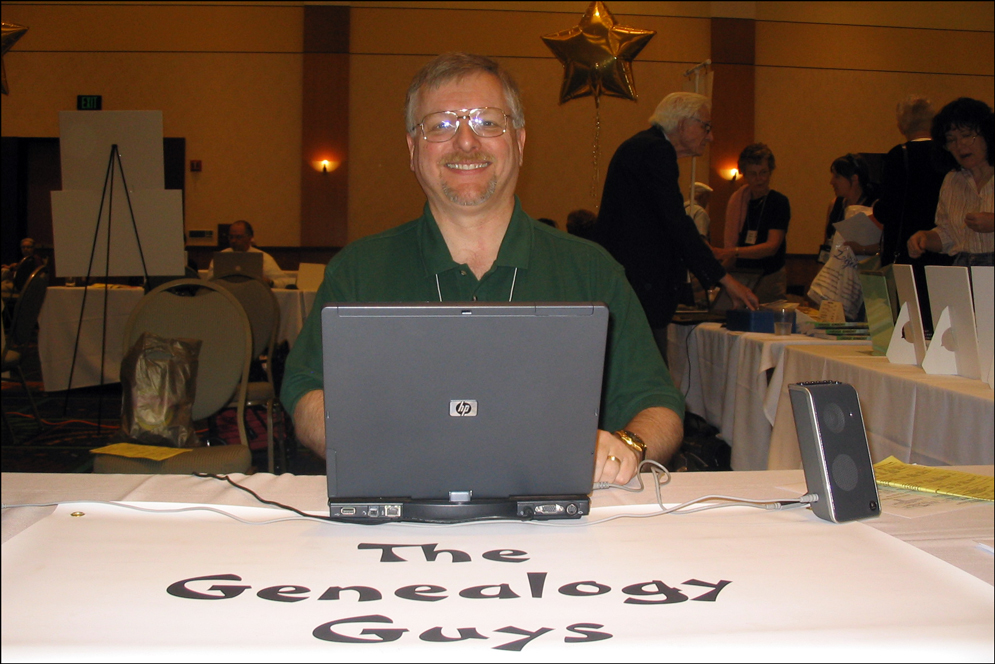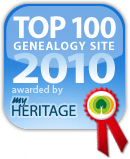Drew Smith of the Genealogy Guys Podcast presented a lecture on “What’s My Next Step? The Organized Genealogist” on Sunday morning. When Drew previously presented this talk for a Jewish organization, he titled it “Doing Genealogy without the Guilt”.
Drew Smith at Jamboree 2007
All too often, we find ourselves guilty of having unaswered e-mail, obtaining the same information more than once, being unsure of where we are in our research, and having piles of unfiled papers and unentered data. Reasons we are guilty range from depending too much on our limited human memory, to not having a view of the big picture, to lacking a plan, and to lacking a system to keep ourselves on track.
Drew presented ten ideas on how to keep ourselves organized:
-
Look at everything you already do to stay organized, identify what is already working, and apply those techniques to other parts of your life.
-
Identify your workspace, organize that space, even if you have to make messes elsewhere, and continue to organize and push out further.
-
Identify your activities and group together everything you need to perform those activities.
-
Items you use frequently should be within reach, while those items you use less frequently should be further away.
-
Locate the items you need where you can see them. Use transparent containers, standup file organizers, and wall calendars. Items that are out of sight are frequently out of mind.
-
Identify your goals for the year, break them up into manageable pieces, and make them visible. Review your goals at the beginning of each year.
-
A project is anything that takes more than one step. Decide what your next step is on each of your projects and make a list of these steps to form a “To Do” list.
-
Keep a folder for reminders of phone calls, emails, and orders for which you are waiting. Assign a date to these things and put them on your “To Do” list.
-
Put all incoming materials in a single location. Keep the wastebasket handy.
-
Organize your tasks according to where you need to be to perform those tasks. Check your “To Do” list so you can accomplish tasks for a single location at the same time.
Drew recommended three books for organizational techniques (citations for these books were automatically generated according to the Chicago Manual of Style at http://www.worldcat.org):
Allen, David. 2001. Getting things done: the art of stress-free productivity. New York: Viking.
Â
Morgenstern, Julie. 2004. Organizing from the inside out: the foolproof system for organizing your home, your office, and your life. New York: Henry Holt.
Morgenstern, Julie. 2004. Time management from the inside out: the foolproof system for taking control of your schedule–and your life. New York: Henry Holt/Owl Books.
Copyright © 2007 by Stephen J. Danko








Steve, thank you so much for sharing with us! I am really enjoying the jamboree you attended! Great information, always showing there is so much to learn and improve on. I am a little jealous I wasn’t able to attend, and I KNOW you really enjoyed it! love the picture of Drew too!
Hi Cheryl!
I had a great time at Jamboree. Every presentation was superb! You and I will have to get together at some genealogy event in northern California sometime!
Maybe we can attend the same meeting in Oakland , for CGS? I noticed you re-joined. I do not belong, but wold love to go sometime and check it out! I will have to go back and see when they meet….what do you think?
The Time Managment book by Julie Morgenstern is excellent; it helps to put time, something that’s always been difficult for me to manage because it’s intangible, into a more physical state for me, and thus use it more effectively.